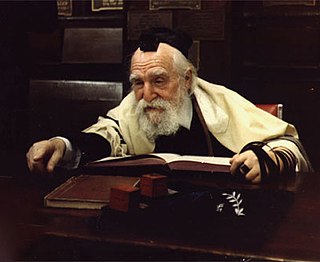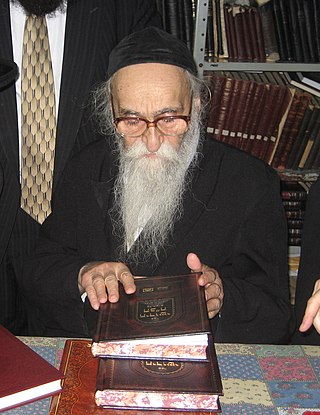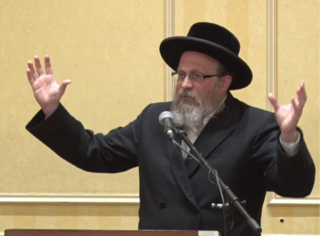Related Research Articles
Negiah, literally "touch", is the concept in Jewish law (Halakha) that forbids or restricts sensual physical contact with a member of the opposite sex except for one's spouse, outside the niddah period, and certain close relatives to whom one is presumed not to have sexual attraction. A person who abides by this halakha is colloquially described as a shomer negiah.
Shalom Messas was a Sephardic rabbi and scholar who served as Chief Rabbi of Morocco, and later as Chief Rabbi of Jerusalem.
Rabbi Hershel Schachter is an American Orthodox rabbi, posek and rosh yeshiva (dean) at Rabbi Isaac Elchanan Theological Seminary (RIETS), part of Yeshiva University (YU) in New York City.
Yaakov ben Yaakov Moshe Lorberbaum of Lissa (1760-1832) was a rabbi and posek. He is most commonly known as the "Ba'al HaChavas Da'as" or "Ba'al HaNesivos" for his most well-known works, or as the "Lissa Rav" for the city in which he was Chief Rabbi.

Boruch Ber Leibowitz (Yiddish: ברוך בער לייבאוויץ Hebrew: רב ברוך דוב ליבוביץ, romanized: Boruch Dov Libovitz; 1862 – November 17, 1939, known as Reb Boruch Ber, was a rabbi famed for his Talmudic lectures, particularly in that they were rooted styled in the method of his teacher Chaim Soloveitchik. He is known for leading Yeshivas Knesses Beis Yitzchak in Slabodka and Kaminetz.

Michel Yehuda Lefkowitz was an Israeli Haredi Torah leader and rosh yeshiva in Bnei Brak for over 70 years. He was a maggid shiur at Yeshivas Tiferes Tzion from 1940 to 2011 and rosh yeshiva of Yeshivas Ponovezh L’Tzeirim from 1954 to 2009, raising thousands of students. He was a member of the Moetzes Gedolei HaTorah of Degel HaTorah, a member of Mifal HaShas, and nasi (president) of the Acheinu kiruv organization, and played a leading role in the fight for Torah-true education in yeshivas and Talmud Torahs in Israel. In addition to his own Torah works, he published the teachings of his rebbi, Rabbi Shlomo Heiman, in the two-volume Chiddushei Shlomo.

Moshe Feinstein was an American Orthodox rabbi, scholar, and posek. He has been called the most famous Orthodox Jewish legal authority of the twentieth century and his rulings are often referenced in contemporary rabbinic literature. Feinstein served as president of the Union of Orthodox Rabbis, Chairman of the Council of the Moetzes Gedolei HaTorah of the Agudath Israel of America, and head of Mesivtha Tifereth Jerusalem in New York.

Zalman Nechemia Goldberg was a rabbi, posek, and rosh yeshiva in Israel. The scion of a Lithuanian Jewish family, Goldberg was also a son-in-law of Shlomo Zalman Auerbach.
Gadol or godol is used by religious Jews to refer to the most revered rabbis of the generation.

Meshulam Dovid Soloveitchik was a Haredi rabbi and rosh yeshiva of one of the branches of the Brisk yeshivas in Jerusalem.

Rabbi Moshe Weinberger is an American Chasidic rabbi, outreach educator, author, translator, and speaker. He is the founding rav of Congregation Aish Kodesh in Woodmere, New York, and former Mashpia/mashgiach ruchani at the Rabbi Isaac Elchanan Theological Seminary (RIETS). To date, he has recorded more than 5000 lectures on chasidic thought and philosophy as well as halacha and a variety of other topics in Judaism.
In Jewish law, a Posek is a legal scholar who determines the position of halakha, the Jewish religious laws derived from the written and Oral Torah in cases of Jewish law where previous authorities are inconclusive, or in those situations where no clear halakhic precedent exists.

Knesses Chizkiyahu was one of the first Litvak yeshivas founded after the establishment of the State of Israel and one of the first Torah institutions in the northern part of the country. Founded in Zikhron Ya'akov in 1949, it relocated to Kfar Hasidim, adjacent to Rekhasim, in 1955, where it operates today with nearly 200 students and a kollel.
Yerucham Gorelick was a distinguished Rosh yeshiva in the Rabbi Isaac Elchanan Theological Seminary (RIETS) for forty years (1943–1983).
Yisroel Moshe Dushinsky also known as the Maharim, was the second Rebbe of the Dushinsky Hasidic dynasty of Jerusalem, Israel. He assumed the leadership of the Hasidut at the age of 28 upon the death of his father, Rabbi Yosef Tzvi Dushinsky, founder of the dynasty. He was also a member of the rabbinical court of the Edah HaChareidis for over 40 years, completing his tenure as the seventh chief rabbi of the Edah HaChareidis from 1996 to 2003.

Moshe Aharon Poleyeff was an American rabbi, teaching at Yeshiva University (YU) in New York where he was a Rosh Yeshiva for over 45 years, training generations of rabbis, including Rav Mordechai Gifter.
Ephraim Greenblatt (1932–2014) was a rabbi and halachic authority in the United States, and at the end of his life in Jerusalem. He was famous for his many halachic answers and is considered a leading disciple of Moshe Feinstein.
Rabbi Raphael Pelcovitz, best known for his years as rabbi of Far Rockaway's Congregation Knesseth Israel was also the author of four books published by ArtScroll.

Chaim Zev Malinowitz was a Haredi community rabbi, dayan, and Talmudic scholar. Fluent in all areas of the Talmud, halakha, and hashkafa, he was the general editor of the 73-volume Schottenstein Edition of the Babylonian Talmud published by ArtScroll. After immigrating to Israel, he became the rabbi of Beis Tefillah Yonah Avraham, an English-speaking congregation for Anglophone Israeli immigrants in Ramat Beit Shemesh, which he led for 17 years.

Rabbi Nota Greenblatt (1925-2022) was a world-renowned misader gittin, co-founder of the Memphis Hebrew Academy in Memphis, Tennessee, and the leader of the Vaad HaKehilloth of Memphis.
References
- ↑ HARAV HAGAON R. MELECH SCHACHTER ZT”L
- ↑ Hesped for Rabbi Melech Schachter
- ↑ Iggerot Moshe, Even HaEzer vol. 4 Siman 98
- ↑ Highlights of Hilchos Meuberes & Meinekes Chaveiro and Havchana - Even HaEzer Siman 13
- ↑ Hesped for Rabbi Melech Schachter
- ↑ Jachter, Chaim (2016). "An Irritating Name in a Get - Rav Melech Schachter's zt"l Resolution of a Tense Situation". Kol Torah. Halacha. Torah Academy of Bergen County. 26. Retrieved 23 December 2020.
- ↑ Paid Notice: Deaths SCHACHTER, RABBI MELECH
- ↑ Bereishis 5776
- ↑ Goldberg, Efrem (27 May 2020). "Behind the Bima (Episode #9 5.27.20) Special Guest: R' Shay Schachter". YouTube. Boca Raton Synagogue. Retrieved 22 December 2020.